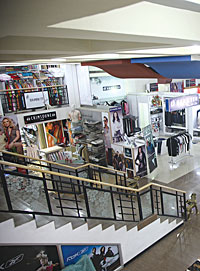 ANUP PRAKASH |
The Nepali retail scene has been promising compared to that in many other South Asian cities of comparable size. Even Nepalis with little disposable income spend more on apparel and consumables compared to their brethren in the region. The success of brands like John Players and Springwood, the exponential growth of Bhatbhateni or the new retail outlets mushrooming in Kumaripati and Sherpa Mall all show that Nepalis like brands and organised retail.
Retail business is one of the most lucrative globally, with Walmart having grown into a company with an annual turnover equal to the GDP of the fifteenth largest economy. The future growth of India and China will also see many global retail giants expanding and new chains starting operations in emerging markets. Nepal won't see large retail stores until laws that prohibit foreign investment in the retail sector are changed. And they must be changed soon.
The growth of retail means Nepali companies can learn how global brands keep store shelves stocked. For instance, the popular pickle brand Navaras is hardly available in store shelves. It makes one wonder whether they realise how much revenue they are losing.
But even as the global brands have made inroads into the local market, Nepalis have much to learn. People who have been to the City Center would notice how poorly trained store staff are when compared to their counterparts in Gurgaon or Bangkok. Instead of uselessly whiling away their time, they should understand that they're introducing Nepalis to a new experience. It would help to introduce performance-based payments to give them extra incentive.
We killed performance based incentive to staff in our hospitality industry by levying a fixed service charge irrespective of service. We shouldn't let the same happen with retail. We have seen a big deterioration in the quality of services in the service industry and we should not loose the ubiquitous Nepali smile which has been the hallmark of that industry.
We need to consider the impact these malls will have on energy demand in the country. The Beed has long said that energy demand is definitely higher even than the 2500MW it would be if the supply of energy were limitless.
Nepali consumers pay a lot to middlemen between wholesale and retail. Walmart in the US and Big Bazaar in India have cut out the middlemen, so their goods are cheap. In Nepal, people continue to profit from artificially raising margins, whether legal or not. The recent hoarding is a case-in-point. Perhaps this is where we'll learn our biggest lesson.



